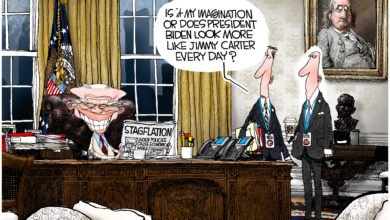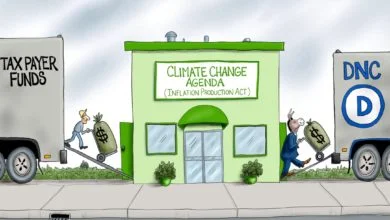New Jersey’s Plastic Bag Ban Backfire, Explained
There’s a famous scene in Seinfeld in which George passes on a TV pilot deal with NBC, only to later accept for less money than originally offered.
“In other words, you held out for less money,” Jerry says after George tells him the deal. “You know the basic idea of negotiation, as I understand it, is to get your price to go up.”
The scene comes to mind after learning about New Jersey’s recent attempt to save the environment by banning single-use plastic bags in grocery stores.
A new study published by Freedonia Custom Research confirmed that New Jersey’s law, which went into effect in 2022, backfired badly.
While the state’s ban — which, unlike those of other states, also prohibited single-use paper bags — led to a more than 60 percent decline in total bag volumes, it also had an unintended consequence: a threefold increase in plastic consumption for grocery bags.
How this happened is no mystery.
The massive increase in plastic consumption was driven by the popularity of heavy-duty polypropylene bags, which use about fifteen times more plastic than polyethylene plastic bags.
“Most of these alternative bags are made with non-woven polypropylene, which is not widely recycled in the United States and does not typically contain any post-consumer recycled materials,” the study explains. “This shift in material also resulted in a notable environmental impact, with the increased consumption of polypropylene bags contributing to a 500% increase in greenhouse gas (GHG) emissions compared to non-woven polypropylene bag production in 2015.”
Needless to say, this was not the result proponents of the policy had hoped for. Doug O’Malley, the director of the group Environment New Jersey, said in 2022 that the goal of the policy was to “initiate a culture shift” by reducing plastic waste and pollution. Instead, the policy has become the butt of jokes.
“This ought to be the motto of the climate lobby,” the Wall Street Journal editorial board quipped. “We don’t help the environment, but we feel good about it anyway.”
What Happened?
New Jersey’s economic backfire deserves some mockery. As the Nobel Prize-winning economist Milton Friedman famously pointed out, policies must be judged not by their intentions but by their results. And the results of the policy were dismal.
But it’s also important to understand why the policy failed. There are several explanations, but the best place to start is the policy’s flawed assumptions.
Policy makers assumed the heavy-duty polypropylene bags would be better for the environment because they can be used over and over again, unlike the single-use plastic bags. The problem is, evidence shows that few people actually do this.
As early as September 2022, the New York Times had identified a major problem with the ban on single-use plastic and paper bags. People were accumulating far too many of the heavier-styled polypropylene bags.
Indeed, the Grey Lady showed pictures of numerous shoppers who’d accumulated mountains of shopping bags. One problem was that delivery services were using the reusable bags to deliver groceries to consumers. As a result, instead of having a bunch of single-use plastic or paper bags they could save or discard, consumers had a plethora of heavy-duty reusable bags they could save or discard.
Though many people no doubt just pitched the bags, some people kept them to “avoid waste.” A man the newspaper interviewed named Brian Otto had 101 of them. Nicole Kramaritsch of Roxbury had 46 stuffed into her garage. A woman from Whippany had 74.
“I don’t know what to do with all these bags,” the Whippany woman told the Times.
A second problem was that consumers didn’t like using their reusable bags over and over, which resulted in mass amounts of waste.
The Times quoted a professor at the University of Michigan School for Environment and Sustainability who explained that a typical reusable polypropylene bag must be used “at least 10 times” to offset the additional energy they require compared to a typical plastic bag.
But the Freedonia study found that, on average, reusable polypropylene bags are used “two to three times before being discarded, falling short of the recommended reuse rates necessary to mitigate the greenhouse gas emissions generated during production and address climate change.”
The study doesn’t say why consumers typically only use a bag a few times before throwing it away, but it’s important to understand that consumers aren’t behaving irrationally in doing so.
An abundance of research stretching back decades shows those reusable plastic bags tend to carry bacteria, some of which can be dangerous.
New York banned single-use plastic bags years ago to “reduce waste and protect the environment,” but the state’s health department concedes reusable bags come with a trade-off.
“When you carry food or other items in these bags, they may leave behind germs like E. coli or Salmonella,” notes the Department of Health. “If the bags are not properly washed and dried before they are used again, these germs remain and can make you sick.”
Many consumers likely determine it’s safer to pitch their reusable bags after a few uses rather than risk getting sick. And while some might clean their bags over and over to keep using them, perhaps more shoppers determine it’s not worth their time and energy.
Energy is a key word here. As sustainability engineers point out, cleaning reusable bags also requires resources, and not trivial amounts.
“Don’t always assume that reusable is the best option,” says Dr. Shelie Miller, an environmental engineer at University of Michigan’s Center for Sustainable Systems who co-authored a 2021 study titled “Environmental payback periods of reusable alternatives to single-use plastic kitchenware products.”
“Our study,” Dr. Miller added, “showed that some reusable alternatives never break even because it takes more energy, and generates more greenhouse gas emissions, to wash them than it takes to make the single-use plastic item.”
Of Good and Bad Economists
The outcome of New Jersey’s ban, as well as the research conducted by environmental engineers like Dr. Miller, is a perfect illustration of an economic truth.
“There are no solutions,” the economist Thomas Sowell once observed. “There are only trade-offs.”
Sometimes the trade-offs are good; sometimes they are not, as in New Jersey’s case. But every action or policy comes with countless secondary consequences. Indeed, even though New Jersey’s ban harmed both consumers and the environment, it was not without positive secondary consequences for some.
It turns out that the ban on single-use bags, which must be purchased, was a boon for manufacturers and grocery stores.
“An in-depth cost analysis evaluating New Jersey grocery retailers reveals a typical store can profit $200,000 per store location from alternative bag sales,” the Freedonia study asserted; “for one major retailer this amounts to an estimated $42 million in profit across all its bag sales in NJ.”
Ignoring the secondary consequences of a policy and focusing solely on its primary intended consequences is what the famous economics writer Henry Hazlitt identified as one of the greatest fallacies in “the dismal science,” and what separates a bad economist from a good one.
“The bad economist sees only what immediately strikes the eye,” the Economics in One Lesson author wrote. “The good economist also looks beyond.”
The Fatal Conceit
Still, there’s an even bigger economic lesson that can be gleaned from the Garden State’s quixotic effort to improve the environment through its clumsy ban. It’s one of economic humility.
“The curious task of economics,” the Nobel Prize-winning economist F. A. Hayek wrote in The Fatal Conceit, “is to demonstrate to men how little they really know about what they imagine they can design.”
Economic systems are complex, virtually infinitely so. And the great lie of the 20th century was the hubristic belief that economies could be effectively administered through the centralization of decision-making, wielded by a small number of politicians and bureaucrats.
The effort to centralize economies was manifested most obviously in the rise of socialist systems in the 20th century, dozens of which failed miserably (and universally) and brought about widespread economic dysfunction and oppression.
But as the economist Ludwig von Mises pointed out, centralization did not just plague command-style economies. It also afflicted mixed economies that increasingly—and naturally, in Mises’s opinion—are pulled in the direction of statism.
“It is in the nature of a system of government control of business to aim at the utmost centralization,” Mises observed in Bureaucracy. “In voting for government control of business the voters implicitly, although unwittingly, are voting for more centralization.”
This pull toward centralization stems from an idea, Hayek observed: the notion that man possesses the knowledge to plan economies effectively, which breeds a “fatal striving to control society.”
This is in stark contrast to the lesson of Leonard Read’s famous essay “I, Pencil,” which channels a message of economic humility in its recognition that, despite all of man’s grand feats, no person in the world could engineer something as simple as a lead pencil.
The miracle of the pencil (and billions of other products) is not a triumph of government or central planning, but of the invisible hand of capitalism, which involves billions of people working in voluntary concert together.
When we break from this model, we end up with policies that achieve results like those in New Jersey.
One can practically hear Jerry Seinfeld: “You know the basic idea of a ban on plastic grocery bags, as I understand it, is to get plastic consumption and greenhouse gasses to go down.”
Content syndicated from Fee.org (FEE) under Creative Commons license.
Agree/Disagree with the author(s)? Let them know in the comments below and be heard by 10’s of thousands of CDN readers each day!





They seem to get everything wrong in the state of insanity. When a famous retail chain with the same name as a famous US Army officer failed to receive delivery of its paper bags I had to bring my un-bagged purchases to my vehicle in the rain. Were it not Christmastime I would have left my purchase for a refund.